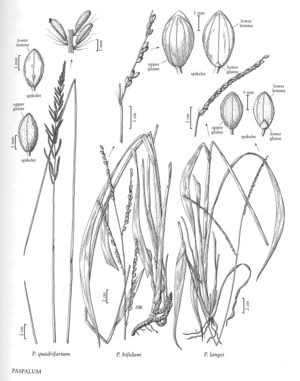Paspalum langei
Plants perennial; cespitose. Culms 23-125 cm, erect; nodes glabrous or pubescent. Sheaths glabrous or pubescent; ligules 0.6-1.9 mm; blades to 38 cm long, 4-18 mm wide, flat, glabrous or pubescent, dark green. Panicles terminal, with 1-3(4) racemosely arranged branches; branches 2.3-13.4 cm, erect to divergent, terminating in a spikelet; branch axes 0.2-1 mm wide, glabrous, margins scabrous. Spikelets 2.1-3.3 mm long, 1.3-1.6 mm wide, paired, imbricate, appressed to the branch axes, elliptic to obovate, stramineous to brown. Lower glumes 0.4-1.2(1.8) mm, stramineous to brown; upper glumes with papillose-based short pubescence, 3- or 5-veined, margins entire, lower lemmas with papillose-based short pubescence, lacking ribs over the veins, 3-veined, margins entire; upper florets light stramineous. Caryopses 1.3-1.5 mm, light to dark brown. 2n = 40, 60.
Distribution
Okla., Fla., Tex., La.
Discussion
Paspalum langei is native from Texas to Florida, and extends through Mexico to Venezuela and the Antilles. It grows at the edges of moist woods and in disturbed areas.
Selected References
None.
